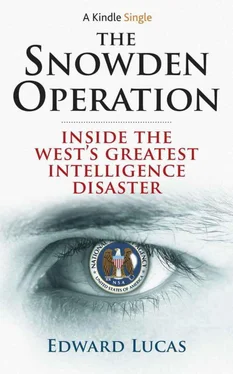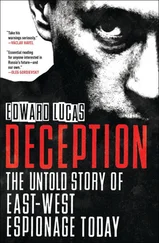The disclosures of espionage by American allies damage them too. Diplomatic capital is consumed in issuing new assurances and tokens of friendship, as Australia has had to do with Indonesia. Other agreements may be put on hold. Trust is the most valuable commodity in espionage. Stolen secrets are fragile and perishable commodities. The instinctive desire of every intelligence officer and every spy service is to hoard, not to share. That preserves sources and methods, and makes the next secret easier to obtain. Handing hard-won material to a foreign partner is possible only when you believe that the country concerned is at least as trustworthy as you are yourself. The NSA’s failure to keep its secrets has dented America’s reputation as a trustworthy partner.
The quite unnecessary damage caused by Snowden makes it hard to believe that his aim was solely to expose wrongdoing. It looks far more likely that he was trying to cripple the NSA and its allies, and to hurt America’s standing in the world. Taking a huge cache of documents, and in a way that largely defies description, analysis or mitigation, is not the action of a patriotic whistleblower. It is the behaviour of a saboteur. It is a sign of the desperation now reigning in the NSA that some are willing to offer him an amnesty even now, if he will only hand back the missing files. Nobody can be confident that they have not been seen by others. But at least the agency will have a clearer idea of what was taken, and how.
All this damage, of course, suits Russia. The NSA and other American and allied intelligence and security agencies have been a prime target for the Kremlin since even before the Cold War. The successes have been great: recent triumphs include recruiting the heads of Soviet counter-intelligence at the FBI (Robert Hanssen) and the CIA (Aldrich Ames). Signals intelligence in the ‘Five-eyes’ alliance of America, Britain, Canada, Australia and New Zealand has been a particular target. Western countries have shifted their attention since the end of the Cold War. The reverse is not the case. The ten Russian ‘illegals’ arrested in America in June 2010 prompted a lengthy, disabling and so far fruitless search within the NSA for the sources which at least one of them was believed to have recruited there. Was Snowden’s decision to do what seems like deliberate damage to the NSA and America mere recklessness and vindictiveness? Or was there another motive, conscious or unconscious, in the background? No definitive answer to that is available on the evidence presently available. But some historical examples are instructive.
Chapter Four: History Lessons
In the 1970s, the nuclear disarmament movement in the West was moribund. People worried more about the energy crisis, militant trade unions, terrorism and other issues. That began to change in 1977, when the Soviet leadership launched a vigorous and successful public campaign in continental Europe against the ‘neutron bomb’—an American anti-tank weapon aimed at shoring up the alliance’s fragile conventional defences in Europe. The anti-nuclear cause was fuelled further by the NATO decision in 1979 to place Cruise and Pershing missiles in Europe in response to the Soviet deployment of the similar SS20 missiles from 1977 onwards.
As the anti-nuclear movement mushroomed, the Atlantic alliance came under huge strain. Ronald Reagan was seen in Europe as a warmonger and a cowboy. Pro-American governments burned political capital fighting against seductive if simplistic arguments. Surely it was better to have fewer nuclear weapons, not more? Why not try unilateral confidence-building moves to defuse tension, rather than escalate the risk of war by boosting arsenals further? ‘Ban the bomb’, and the romantic eccentricity of the ‘Women’s Peace Camp’ at Greenham Common near London, had an appeal that the dry arguments for the status quo could not match. Few went as far as the Spartacist League, with their hallmark chant of ‘Smash NATO! Defend the Soviet Union!’ But the consensus in the peace movement was that America was a bigger threat than the Soviet Union.
The Soviet Union’s own role in the anti-nuclear movement is still unclear. Defectors such as Stanislav Lunev (from Russia’s GRU military intelligence service) and Sergei Tretyakov (of the SVR foreign intelligence service) have made sweeping claims. Academic studies have been more cautious. After Communism collapsed, a senior member of Britain’s CND, Vic Allen, unrepentantly admitted to passing information to the East German Stasi. [69] http://news.bbc.co.uk/1/hi/special_report/1999/09/99/britain_betrayed/451366.stm
The Soviet Union financed British and other communist parties, which played a role in the ‘peace’ movements disproportionate to their tiny numbers. [70] The Communist Party of Great Britain played a leading role in CND in the 1970s, when the organisation was largely moribund. CPGB member Dr John Cox was chairman of the CND for seven years during this period. According to ex-MI5 desk officer Cathy Massiter, CND was regarded by the Security Service not as a Communist front organisation but as a Communist-penetrated organisation. Individual pro-Soviet Communists held key positions. Bruce Kent, general secretary of CND, said at the 38th Congress of CPGB in November 1983: ‘We owe a debt of gratitude to the Morning Star newspaper, which has given steady, honest and generous coverage to the whole disarmament case. I do not believe we [i.e. the Communists and the CND] are so very far apart on many of the major issues. We are partners in the cause for peace in this world ’ ( Morning Star , November 14, 1983, emphasis added). A good account of the one-sided nature of the CND campaign, together with fully sourced details of its links with the left, including the Soviet front network, is set out in Paul Mercer’s book ‘ Peace’ of the Dead (Policy Research Publications, 1986). For details, see the website of Julian Lewis MP, for example this letter: http://www.julianlewis.net/letters-in-the-press/3199:yes-the-cnd-was-pro-soviet-108 ; and http://www.julianlewis.net/letters-in-the-press/3158:cnd-cannot-rewrite-history-67 ; as well as http://www.julianlewis.net/selected-news-cuttings/3530:moscow-gold-and-the-cpgb-47 and http://www.julianlewis.net/selected-news-cuttings/3601:gorbachevs-view-of-the-ss20s-2
What is not in doubt is that CND and the like served Moscow’s purpose. To be sure, the campaigners said they opposed Soviet and Western nuclear weapons alike. But the focus of their efforts was asymmetric: they could apply political pressure to Western governments, political parties and institutions, whereas their influence in the Soviet bloc was minimal. The Soviet Union enjoyed conventional military superiority in Europe; demanding a ‘nuclear-free Europe’ in effect meant accepting Soviet hegemony on the continent. ‘Peace’ was therefore a big Soviet talking point in all international forums and discussions, both from diplomats and from nominally independent but state-funded outfits such as the World Peace Council.
Regardless of their direct or indirect involvement, the information-warfare experts of the Soviet KGB were delighted with the divisive and distracting effects the ‘peace’ movement was having in the West. Soviet decision-makers relied on the anti-nuclear campaigners in the West to weaken and constrain the resolve of governments there.
Their successors in the Kremlin now see a similar opportunity. Like the anti-nuclear movement of the early 1980s, modern campaigners for privacy and digital freedom see their own countries’ flaws with blinding clarity, and ignore those of the repressive regimes elsewhere. They manifest a corrosive mistrust for their political leaders and public officials, to the point that little said by governments carries any weight at all.
Читать дальше












